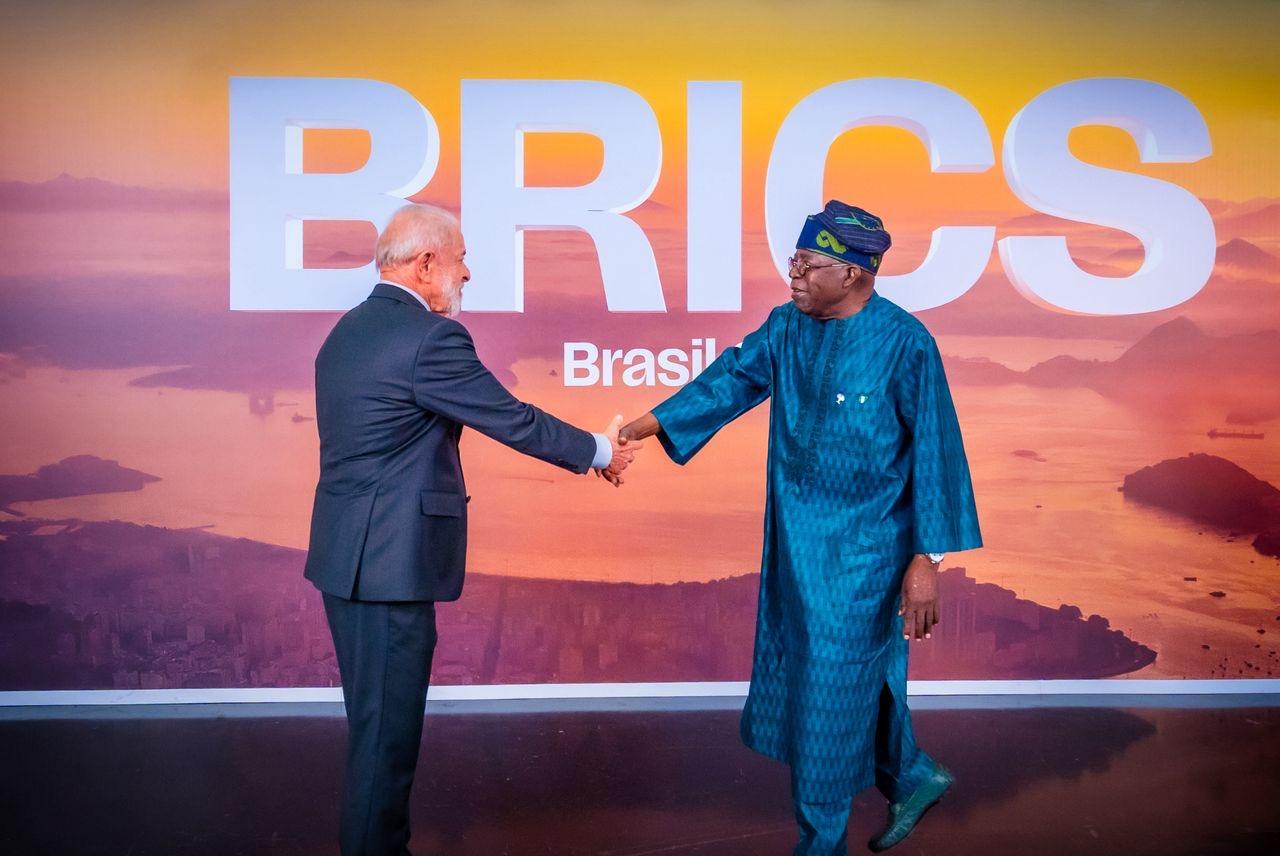
Trump Slaps Nigeria with 10% Tariff in Retaliation for BRICS Alliance Stance

In a move that has sent shockwaves through global markets and diplomatic circles, former United States President Donald J. Trump has announced that Nigeria will be among a list of countries facing an additional 10% tariff on imports should he return to the White House in 2025. The announcement, made during a campaign rally in Michigan on Sunday, was part of Trump’s broader foreign policy message, where he accused several nations—including Nigeria—of “aligning with anti-American forces” through their participation or association with BRICS.
Trump, known for his fiery rhetoric and aggressive stance on international trade, stated that the United States must retaliate against what he called the “economic sabotage” being orchestrated by BRICS—a bloc comprising Brazil, Russia, India, China, and South Africa—which has recently expanded its membership to include several new countries, including Egypt, Ethiopia, Iran, and the United Arab Emirates. Though Nigeria is not yet a full member of BRICS, its recent diplomatic gestures, participation in BRICS forums, and public calls for a multipolar world order have drawn Washington’s attention.
“Nigeria wants to dance with BRICS and enjoy the benefits of America too—it doesn’t work like that,” Trump declared to a cheering crowd. “If you choose to stand with those who want to undermine the U.S. dollar and threaten our economic future, then be prepared to pay the price. Starting with a 10% tariff—maybe more.”
The statement, though not yet official U.S. policy, has already triggered concerns among trade experts, Nigerian policymakers, and international investors. Trump, who is currently the Republican frontrunner for the 2024 presidential election, has a strong chance of returning to power. With his previous administration marked by tariff wars, particularly with China, many believe he will not hesitate to escalate economic pressure on nations he views as disloyal to American interests.
Nigeria, Africa’s most populous nation and largest economy, has been gradually deepening its ties with BRICS over the past two years. The country has attended several BRICS summits and roundtables, advocated for an inclusive global financial system, and expressed interest in using alternative currencies for international trade—moves seen by Washington as a challenge to the dominance of the U.S. dollar. Though Nigeria has not officially applied for full BRICS membership, its increasing alignment with the group has not gone unnoticed.
The Nigerian government has not yet issued an official response to Trump’s comments, but insiders within the Ministry of Trade and Investment are reportedly holding emergency meetings to assess the potential economic impact. According to sources, Nigeria exports a variety of goods to the United States, including crude oil, cocoa, textiles, and agricultural products. A 10% tariff could make Nigerian exports less competitive in the American market and possibly lead to job losses in already fragile sectors.
Economic analysts warn that Trump's proposed tariffs could further destabilize the Nigerian economy, which is already grappling with inflation, currency depreciation, and high unemployment. “This is not a trivial threat,” said Dr. Abiola Okonkwo, a senior economist at the Lagos School of Policy Studies. “If implemented, it will increase the cost of doing business and strain Nigeria’s already troubled export sector. The bigger issue, however, is the signal it sends to other countries that economic alignment with BRICS could come with punitive consequences.”
Internationally, the announcement has reignited debate over the growing rivalry between the Western-led order and the emerging multipolar alliance represented by BRICS. While the original purpose of BRICS was to foster cooperation among emerging economies, it has evolved into a geopolitical counterweight to Western institutions such as the IMF and World Bank. The bloc’s recent calls for de-dollarization and the creation of a common trade currency have been viewed in Washington as a direct challenge to U.S. hegemony.
Trump’s decision to target Nigeria specifically also raises questions about U.S.-Africa relations. During his first term, Trump was often criticized for paying little attention to the African continent, famously referring to some African nations with disparaging remarks. His latest comments suggest that a future Trump administration might adopt a transactional and punitive approach toward African countries that seek to diversify their global partnerships.
“Nigeria needs to carefully weigh its foreign policy options,” said Ambassador Ndubuisi Nwankwo, a former diplomat. “While BRICS offers attractive opportunities, including infrastructure financing and trade diversification, Nigeria cannot afford to alienate the United States, its second-largest trading partner. It’s a delicate balancing act, and inflammatory rhetoric from global leaders like Trump only complicates the equation.”
Meanwhile, supporters of Nigeria’s pivot towards BRICS argue that the country must prioritize long-term economic sovereignty over short-term political pressure. “The U.S. is not the only game in town anymore,” said Tunde Bakare, a trade union leader and BRICS advocate. “Our future lies in a diversified economic portfolio. If Trump wants to bully us with tariffs, so be it. We will find new partners who respect our right to self-determination.”
Nonetheless, there is a growing sense of urgency among Nigerian exporters, who fear that even the mere threat of tariffs could affect buyer confidence in the American market. Some businesses have already begun exploring alternative markets in Asia and South America in anticipation of potential fallout.
Trump’s remarks also raise constitutional questions in the U.S. about the power of the president to unilaterally impose tariffs without congressional approval. While he used executive authority to impose several tariffs during his previous term, legal challenges could arise if he attempts to do so again, particularly on countries with which the U.S. does not have a formal trade conflict.
The Biden administration has not yet commented on Trump’s tariff threat against Nigeria, though officials have repeatedly emphasized a more collaborative approach to Africa. President Joe Biden hosted African leaders at the U.S.-Africa Leaders Summit in 2022, pledging to deepen economic and security ties. Whether that approach will withstand pressure from Trump’s rhetoric remains to be seen.
As the 2024 election approaches, Trump’s foreign policy pronouncements will continue to carry weight, especially given his strong base of support within the Republican Party. For Nigeria, however, the warning is clear: its flirtation with BRICS may come at a price. The coming months will determine whether the country doubles down on its emerging alliances or seeks to mend fences with Washington.
One thing is certain—Nigeria has just been thrust into the middle of a high-stakes geopolitical tug-of-war, and the consequences could reshape its economic future for years to come.

